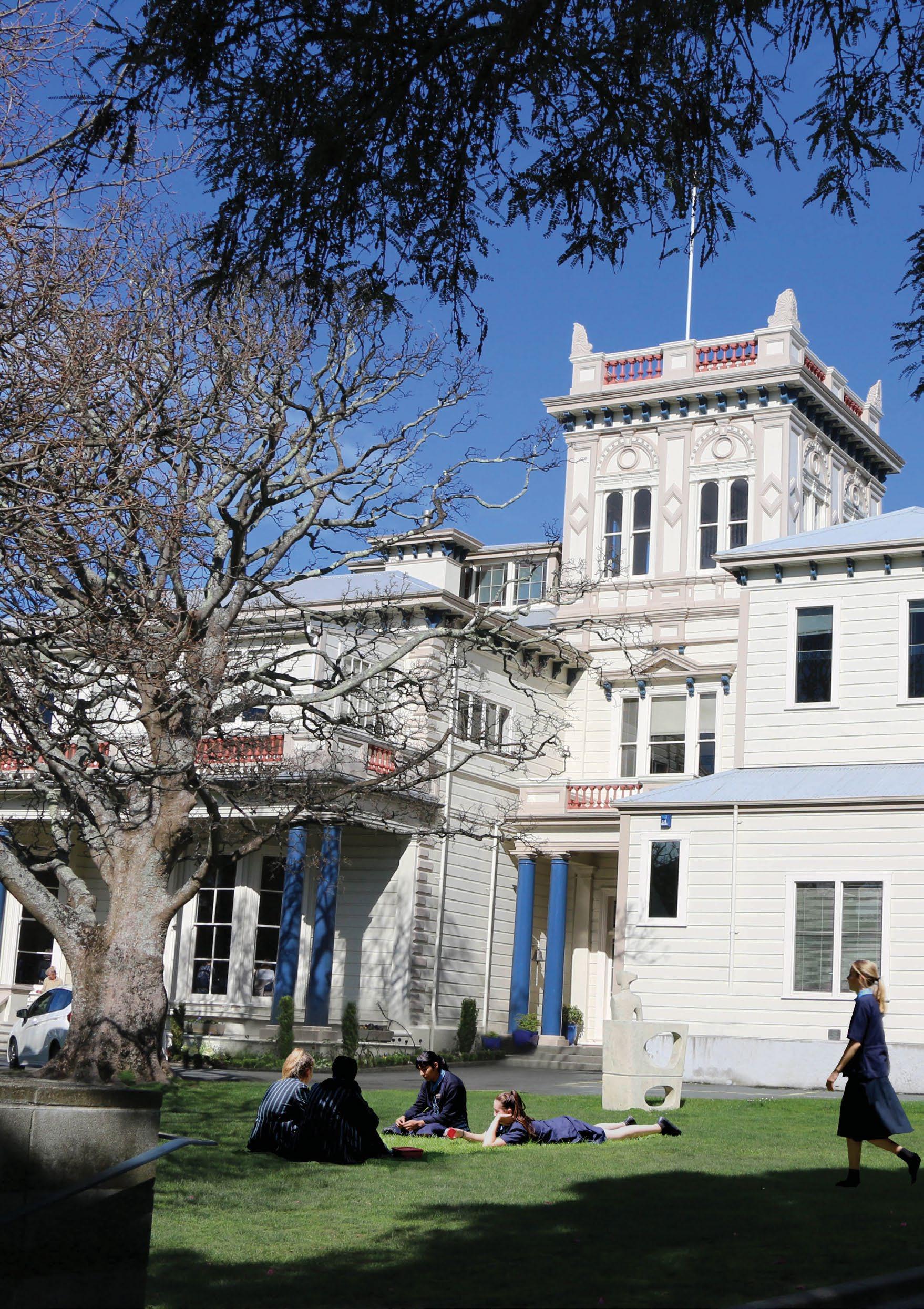

Annual Review for 2025
Includes Annual Fees Statement for 2026
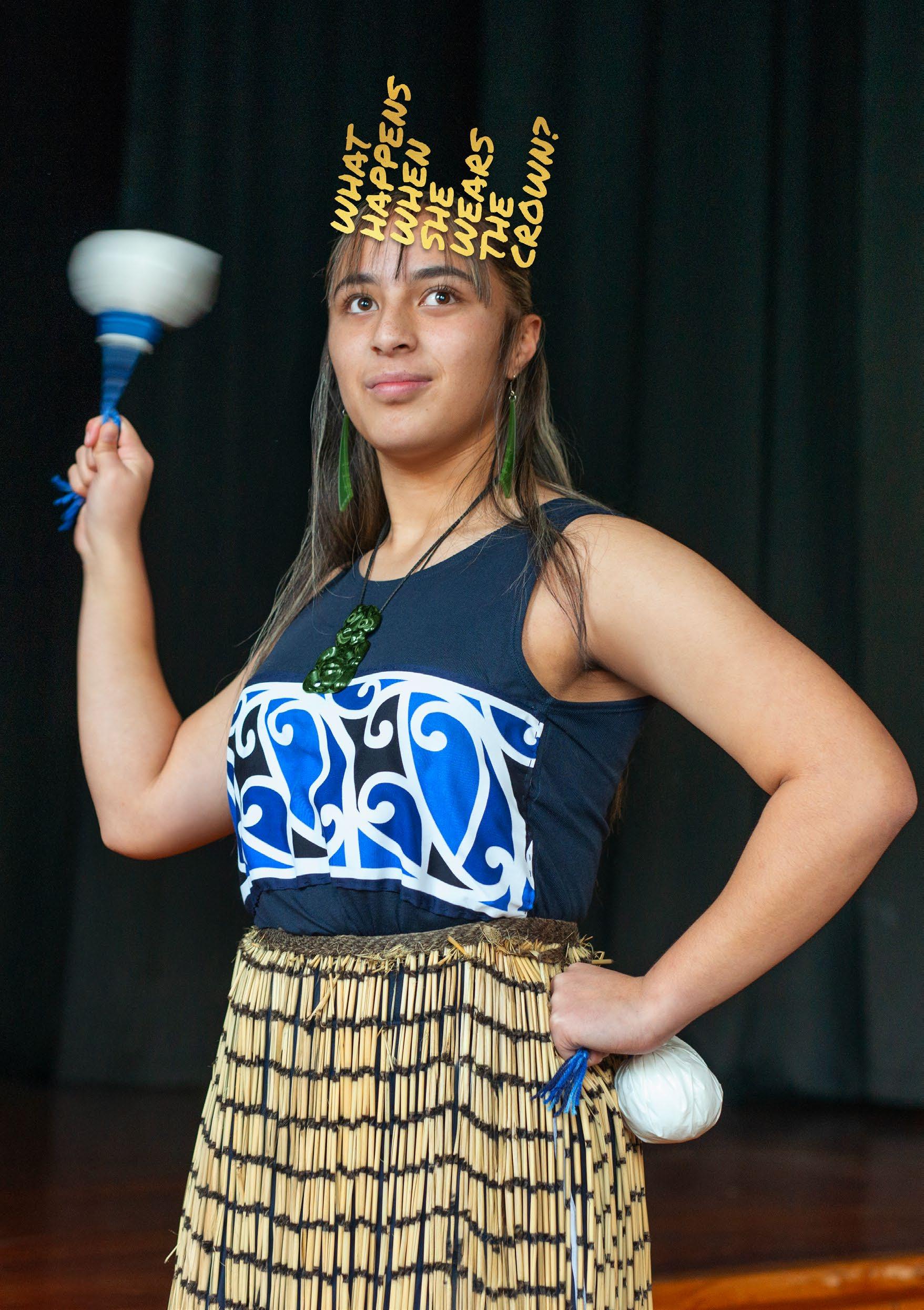

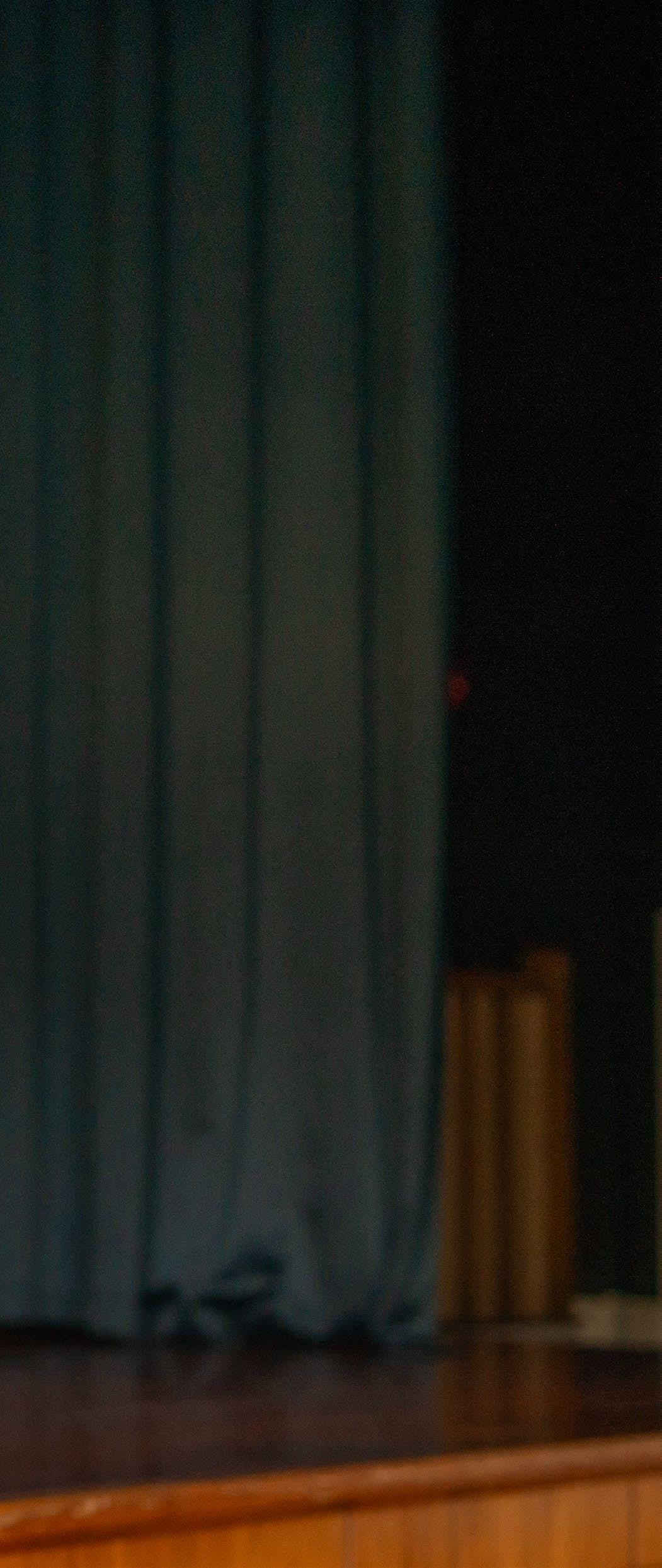
Celebrating 2025 and looking ahead to the future
Queen Margaret College is delighted to present our Annual Review for 2025, celebrating the remarkable achievements and outstanding contributions of our students, staff, parents, whānau and community this year.
In May we were proud to launch our Strategic Plan 2025-2028: Watch It Happen. This futurefocused plan sets us up to successfully create an enduring, dynamic learning environment that empowers our students to succeed in life as passionate learners, resilient wāhine and future leaders. This is more than just a roadmap – it is an unwavering commitment to shaping a future where our students flourish in life, not just in their careers. Our students will be equipped with the skills and mindsets needed to thrive – and lead – in an ever-changing global context. They will be academically capable, emotionally grounded, socially conscious and digitally fluent. Queen Margaret College is not waiting for the future to arrive. We are forging it – together. Find out more on page 4.
As an International Baccalaureate (IB) World School, Queen Margaret College offers both IB and National Certificate of Educational Achievement (NCEA) pathways, ensuring flexibility and academic rigour. We will continue to refine our bespoke programmes to support diverse needs and best equip our students for success. We are engaged in national conversations about the changes proposed in August to NCEA and we are advocating thoughtfully with the best interest of our students at heart. As the landscape evolves, we will continue to ask how can we best prepare our students for a rapidly changing, technologically driven world?
In September construction began on Queen Margaret Residence (QMR), our new boarding residence designed for students in Years 12 and 13. QMR bridges the gap between traditional boarding and independent living. Nestled within our secure campus, this beautiful character home offers a home away from home, preparing students for independent living at university and beyond. Students will gain structured support, life skills development, and leadership opportunities in a nurturing community. QMR will open in Term 1 2026.
As we reflect on 2025, the significance of girls’ education is clearer than ever. Our students pursue their dreams free from gender stereotypes – through the subjects they study, the activities they embrace, and the careers they imagine and pursue. We invite you to explore this Annual Review and join us in celebrating exceptional education for girls and the remarkable accomplishments of our QMC community.
2025 – 2028 Strategic Plan
Watch It Happen
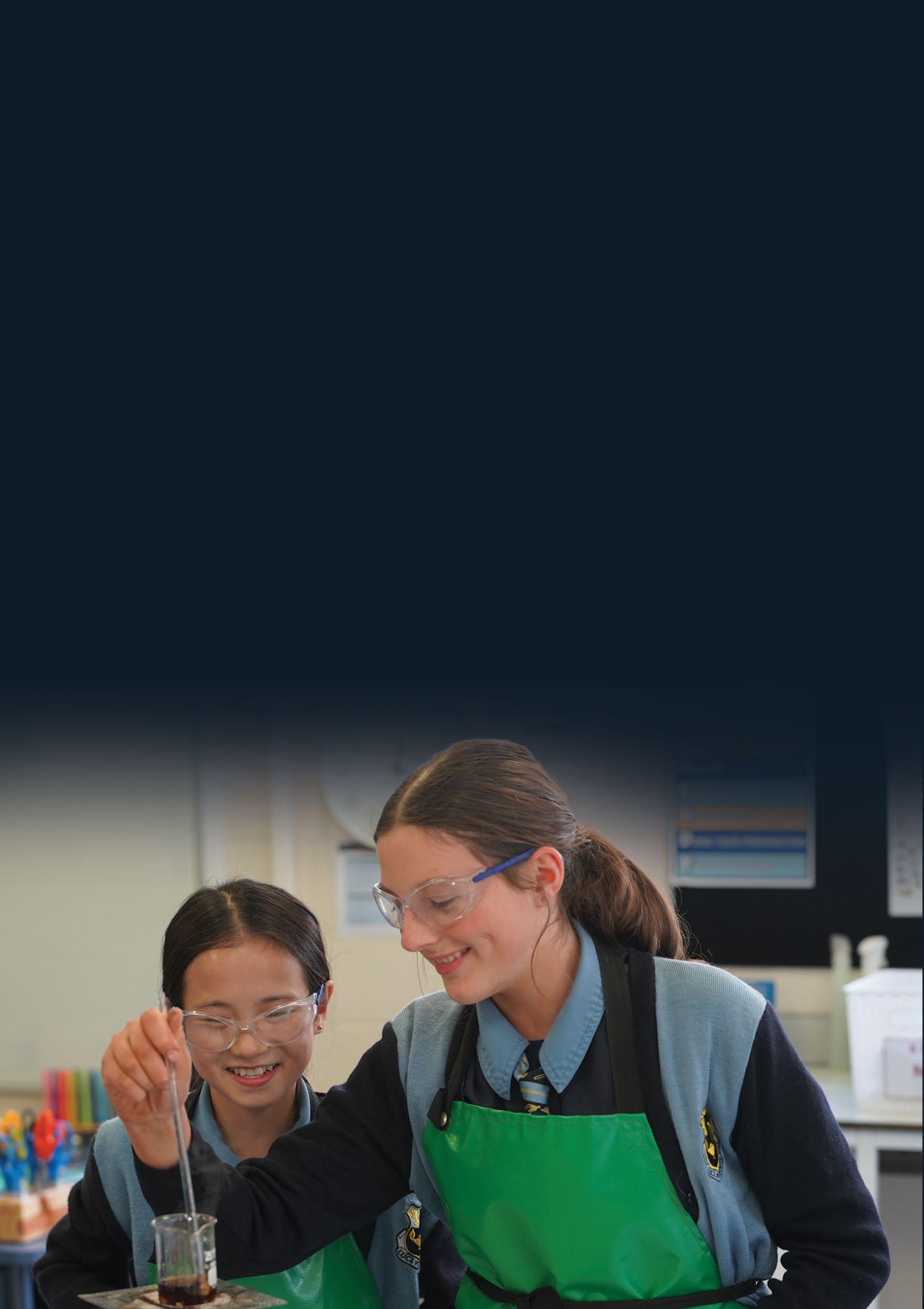
TOEMPOWERYOUNG WOMENTOLIVE,LEARN, ANDLEADCOURAGEOUSLY
MĀIA COURAGE MISSION
LUCEVERITATIS “BYTHELIGHTOFTRUTH.”
MANAAKITANGA GENEROSITY
PONO INTEGRITY WHAKAUTE RESPECT
MANAWAROA RESILIENCE
FUTURISTIC (ACADEMIC)
FUTURISTIC (ACADEMIC)
EMPOWERED (EMOTIONAL)
EMPOWERED (EMOTIONAL)
ENGAGED (SOCIAL)
ENGAGED (SOCIAL)
PREPARED (DIGITAL)
PREPARED (DIGITAL)
SELF (LEADERSHIP)
Our community cultivates entrepreneurial, critical and analytical thinkers who look beyond the immediate, are courageous and solve realworld problems to shape the future.
awareness, empowering us to approach
Our community cultivates entrepreneurial, critical and analytical thinkers who look beyond the immediate, are courageous and solve realworld problems to shape the future. Our community is guided by our values to develop emotional management and selfchallenges with optimism and resilience. Our community will nurture whanaungatanga, adeptly navigate diverse social contexts, and make thoughtful contributions within Aotearoa
New Zealand and globally.
Our community is guided by our values to develop emotional management and selfchallenges with optimism and resilience. Our community will nurture whanaungatanga, adeptly navigate diverse social contexts, and make thoughtful contributions within Aotearoa
At Queen Margaret College we are responsible, ethical and engaged digital citizens. We use technology thoughtfully to build connections,
At Queen Margaret College we are responsible, ethical and engaged digital citizens. We use technology thoughtfully to build connections,
awareness, empowering us to approach New Zealand and globally. drive positive change, and to create and innovate.
drive positive change, and to create and innovate.
SELF (LEADERSHIP) others through authentic leadership, mentoring,
CAMPUS DEVELOPMENT
CAMPUS DEVELOPMENT
OPERATIONAL EXCELLENCE
OPERATIONAL EXCELLENCE
REPUTATION, &PARTNERSHIPS, ENGAGEMENT
REPUTATION, &PARTNERSHIPS, ENGAGEMENT

others through authentic leadership, mentoring,
The members of our community will first know themselves, learn to work as a team, and then lead and coaching.
The members of our community will first know themselves, learn to work as a team, and then lead and coaching.
The College will develop a dynamic campus that honours tradition while embracing innovation. We will create spaces that inspire learning, foster collaboration, and strengthen our community.
The College will develop a dynamic campus that honours tradition while embracing innovation. We will create spaces that inspire learning, foster collaboration, and strengthen our community.
TheCollegewilloperatewithprecisionand innovation,ensuringseamlesssystems,exceptional thatservice,andacultureofcontinuousimprovement supportsstudentsuccess.
TheCollegewillsecureitspositionasaneducational leaderthroughstrategicfinancialmanagement, environmentalstewardship,andinnovative FUTURESSUSTAINABLE andsafedigitalenvironmentandcreateadynamic interactivelearningenvironment. streamlineTheCollegewillleveragetechnologysolutionsto administrativeprocesses,fostera TECHNOLOGY
TheCollegewilloperatewithprecisionand innovation,ensuringseamlesssystems,exceptional thatservice,andacultureofcontinuousimprovement supportsstudentsuccess.
TheCollegewillsecureitspositionasaneducational leaderthroughstrategicfinancialmanagement, environmentalstewardship,andinnovative FUTURESSUSTAINABLE andsafedigitalenvironmentandcreateadynamic interactivelearningenvironment. streamlineTheCollegewillleveragetechnologysolutionsto administrativeprocesses,fostera TECHNOLOGY
TheCollegewillstrengthenitslegacyasaleaderin educationbyfosteringmeaningfulpartnerships, itscelebratingcommunityconnections,andamplifying reputationonthenationalandglobalstage.
strongoperationalpracticestoensureweremain forgenerationstocome.
TheCollegewillstrengthenitslegacyasaleaderin educationbyfosteringmeaningfulpartnerships, itscelebratingcommunityconnections,andamplifying reputationonthenationalandglobalstage.
strongoperationalpracticestoensureweremain forgenerationstocome.
Summary Financial Information 2025

School Roll & Student Profile
QMC students come from diverse backgrounds with a range of life experiences, which help to enrich and inform the values, ethics and wellbeing of all members of the school community.
In February 2025, QMC had 781 students enrolled. By the end of October that number had grown to 791, reflecting a modest but steady increase of enrolment over the year.
As an IB World School we are expanding the perspectives of our students. The curriculum we teach across all year groups promotes multilingualism, intercultural understanding and global engagement.
Student Attendance
Full Day Attendance Rates
Years 1–6
Years 7–13
Enrolment Growth
2025 Roll

2025 Deputy Head Prefect, Alice Egerton (left) and Head Prefect, Haritoa Waaka (right)
Progressive Achievement Tests (PATs) at QMC
At Queen Margaret College, our commitment to evidence-based practice is central to how we support student learning. Progressive Achievement Tests (PATs) are a key tool used to assess achievement in Mathematics, Reading Comprehension, Vocabulary, and Listening Comprehension. These assessments help us identify individual learning needs, monitor progress, and tailor teaching strategies to ensure optimal outcomes.
PATs are multiple-choice assessments that help teachers identify students’ current achievement levels, monitor progress over time, and tailor teaching strategies to meet individual and group learning needs. While most schools administer PATs once annually, QMC conducts these assessments twice a year, at the beginning and end of the academic year, to gain a more comprehensive understanding of student growth. This approach enables us to closely monitor progress across year groups, classes, and individual learners, ensuring targeted support and optimal educational outcomes.
We are pleased to share the results from our first round of 2025 PAT testing for students in Years 3–10, which reflect strong performance in both Mathematics and Literacy.
Years 3–6 Academic Results 2025 Term 1
Years 7–10 Academic Results 2025 Term 1
Mathematics
Reading Comprehension
Year 10 – NCEA Co-Requisite Assessment Results
Deep Dive on Year 6 and Year 10 – Term 1 to Term 4
The timing of this annual edition has also enabled us to a share a snapshot of Mathematics results with a particular focus on the Year 6 and Year 10 cohorts and the gains made from Term 1 to Term 4. Year 6 showed improvement across all performance bands, with notable gains in the upper quartile, median, and lower quartile, indicating strong progress among high-achieving students as well as those previously performing below the median.
Year 10 maintained consistently high performance at the upper end of the scale, with many students already achieving top of the PAT scoring range. Most significantly, we observed meaningful shifts in the median and lower quartile scores, reflecting the impact of targeted teaching strategies and differentiated support.
These results exemplify the effectiveness of QMC’s data-informed approach to teaching and learning, and the strength of our academic programmes in fostering growth across the full spectrum of student achievement.
Mathematics Year 6
Mathematics Year 10
Years 11–13 Academic Results
Our students have consistently attained outstanding results across both the National Certificate of Educational Achievement (NCEA) and International Baccalaureate (IB) Diploma Programmes.
Post-school Disciplines
Science, medicine and law generated the most interest from the Class of 2024, and there is a balance between specialist and comprehensive (formerly generalist) courses.
Class of 2024 Degree Disciplines
• Veterinary
• Hospitality Management
• Dentistry
• Computer Science
• Music
• Environment and Society
• Criminology
• Concept Design
• Global Studies
• Nursing
• Digital Screens
• Communications
• Midwifery
• Architecture
• Speech Language Pathology
• Sport
• Arts
• History
• Te Reo Māori
• Dance
• Design
• Creative Arts
Leavers’ Scholarships
Scholarships provide support and accessibility towards tertiary education. We are delighted 26 students were awarded scholarships toward their 2025 studies.
$5,266,914
International university scholarships
$373,000 Domestic university scholarships
$5,639,914
Total scholarships
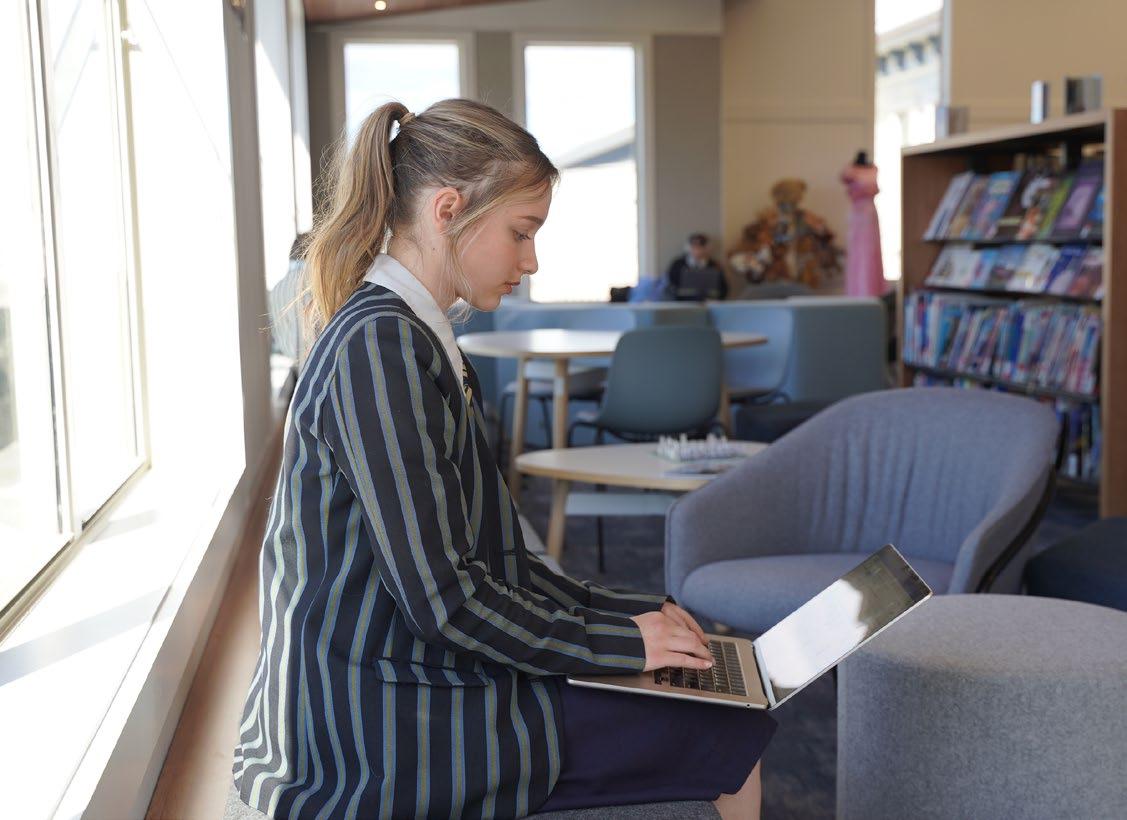
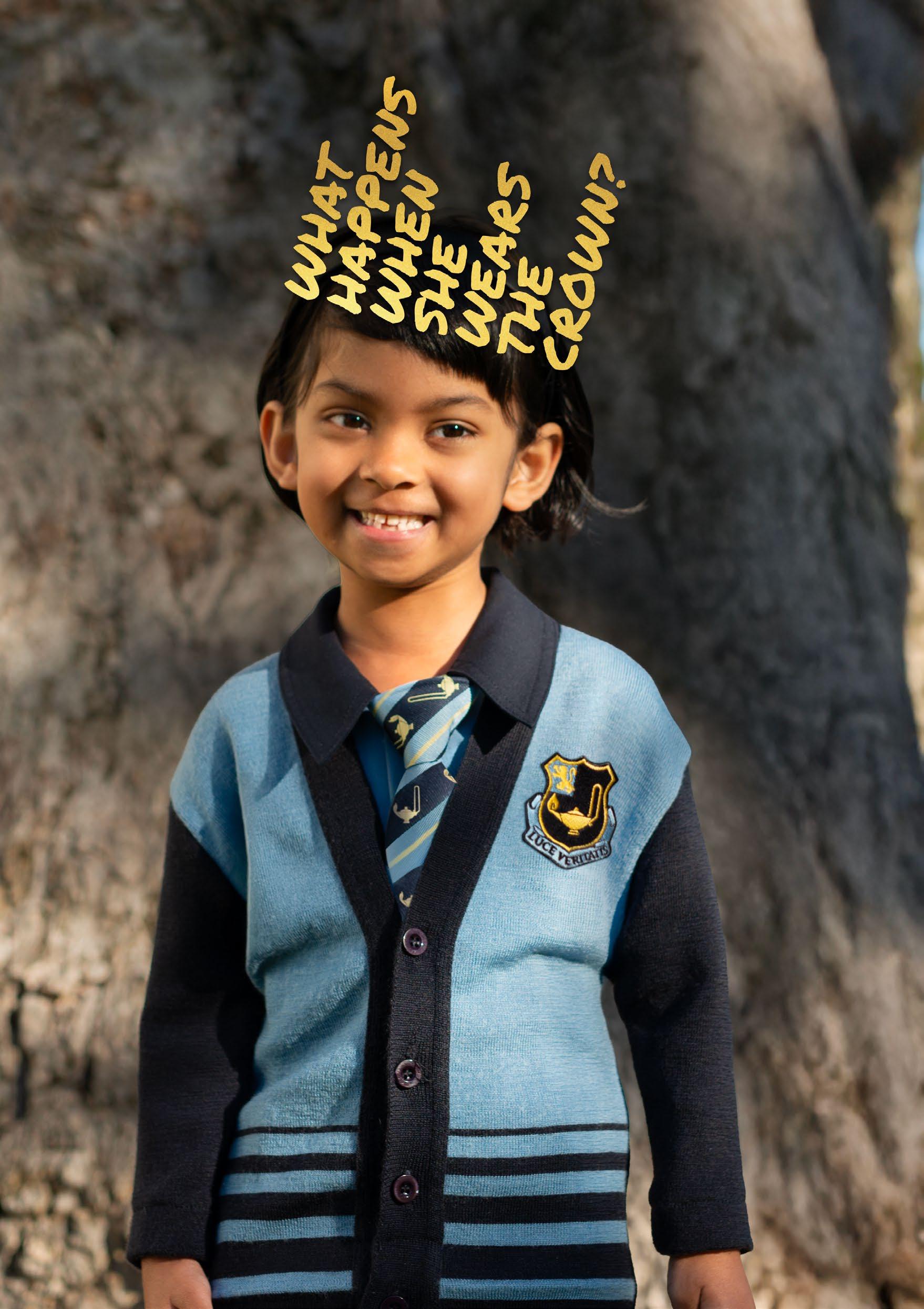
SHE GROWS INTO

Preschool: Primary Years Programme (PYP) and
Te Whāriki

In 2025 we focused on building strong foundations in literacy and numeracy supported by our two curriculum frameworks, the International Baccalaureate Primary Years Programme (PYP) and Te Whāriki. We also emphasised communication skills, social skills and self-management, and supported transitions to Year 1.
Years 1–6 Primary Years Programme (PYP)
One of the highlights of 2025 has been the way our students have embraced the learning opportunities available to them in music and languages. Research shows that learning these subjects extends students’ capacity for learning throughout their life.
Music: From Year 1 to Year 6, every student learns music and sings in either the Tūī or Cherubim choirs and performs at events including Aroha days and Open Day. From Year 3 students learn the violin or cello, progressing to ensemble playing and band. In Year 5 students can choose to add another instrument, including flute, trumpet, clarinet, or drums to take part in band. By Year 6, every girl can read music and perform with confidence. This year’s Arts Extravaganza showcased our students performing with flair and poise.
Languages: Junior School students learn te reo Māori at every year level, including through waiata and kapa haka. Students learn Spanish in Preschool and Year 1 and French from Year 2 using the AIM immersion method. Students in Years 2-6 present plays in French to build fluency and confidence. This year’s plays included Three Little Pigs and Chicken Licken and were enjoyed by an audience of parents.
Year 6 Exhibition: In this PYP milestone, students collaborate and work in a group to explore global issues, conduct research, communicate their findings, and take meaningful action related to their research. This year’s actions included a beach clean-up, fundraising for Wellington Zoo and the creation of a worm farm for the Junior School. Students also created various digital and physical interactions to further stimulate their audience’s thinking. The students presented lines of inquiry into issues related to poverty, climate change, social justice, and more. They interviewed local experts and leaders, including the Head of World Vision, university professors and engineers, members of the judiciary, and former New Zealand
Prime Minister Jacinda Ardern. This year’s exhibition audience said they were blown away by the depth of thinking and the range of ways students demonstrated their findings. The students’ maturity, insight, and creativity demonstrated readiness for the Middle Years Programme and a strong foundation for global citizenship and leadership.
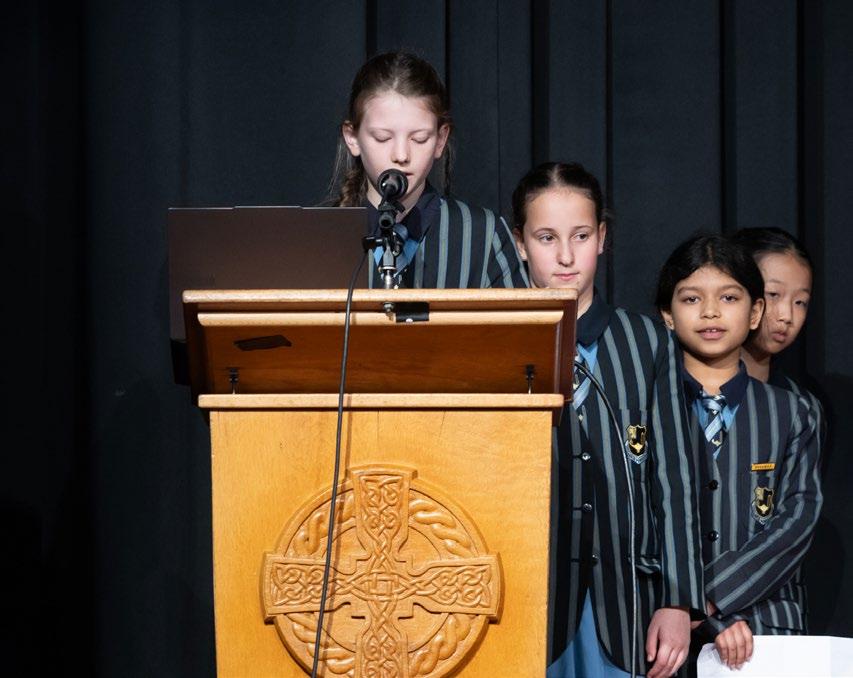
Years 7–10 Middle Years Programme (MYP)
Interdisciplinary Learning

At QMC, a highlight of the International Baccalaureate Middle Years Programme (MYP) is our interdisciplinary learning, which empowers students to integrate knowledge, ideas and concepts across subjects, deepening understanding and enabling insights and solutions that would not be possible through a single discipline. In 2025, this came to life through new interdisciplinary units and the Kaupapa Hapori community project, where Year 10 students combined academic learning with social action in real-world contexts.
Year 7: Individuals and Societies / Mathematics: Te Ara Whakamua: Navigating Pathways Through Time
Students explored how mathematics, geography and history intersect to reveal connections between people, place and time. Through maps, data and waterfront orienteering, students investigated human movement and decision-making. Mathematical tools of measurement, pattern recognition and analysis supported inquiry into how the past shapes the present. Navigation skills such as bearings, compass use and grid referencing became frameworks for understanding identity, belonging, and progress.
Year
8:
Arts (Performing) / Language Acquisition: Being Creative in My New Language
Students explored how language and performance enhance each other by creating dramatic or musical pieces in their chosen language. Tone, rhythm, gesture and vocabulary deepened students’ cultural understanding and built confidence. Collaboration strengthened fluency and performance, while final presentations showed how language is a living art form that connects creativity, culture, and expression.
Year 9: Design / Sciences: Energy Efficient Wharenui
Inspired by the Tuhoe iwi and Lake Waikaremoana, students designed sustainable living spaces using scientific principles like insulation, heat retention, and energy efficiency. They built 1:50 scale Department of Conservation hut models and tested temperature loss. The project blended innovation, cultural respect, and environmental science, and prepared students to apply creative, evidence-based solutions to real-world challenges.
Year 10: Language and Literature / Physical and Health Education: Next Goal Wins
Blending sport, storytelling, and film, students explored communication through movement, teamwork, and cultural perspectives. They analysed narrative, dialogue, and camera techniques, delivered speeches on sport’s impact, and produced game day footage. The unit highlighted how purposeful communication can inspire, influence, and connect across literature, physical activity, and culture.
Year 10 – Community Project: Kaupapa Hapori: Service, Sustainability, Impact
Students identified a community need and designed practical, lasting solutions that emphasised service, creativity, and particularly this year highlighted sustainable practice. Projects included wool bonnets for premature babies, sustainable gardens with instructional websites, food bank donations, and a library system for Arohata Prison. Students promoted community wellbeing through Lego Therapy, basketball coaching, and advocacy for sustainable period care. From can drives to multilingual guides for new students, each initiative reflected compassion, creativity, and a commitment to sustainable long-term impact.
Year 11 – ELEVATE for Courageous Learners
Now in its second year, our bespoke Elevate Year 11 programme continues to meet the diverse needs and interests of students while equipping them with the skills, values, and knowledge to thrive in the 21st century. Elevate enables students to complete a full NCEA Level 1 qualification while preparing for NCEA Level 2 or the International Baccalaureate Diploma Programme (IBDP). In 2025, students engaged in critical thinking, problem-solving, collaboration, and courageous inquiry, supported by a rigorous curriculum designed by staff who are actively engaged with the evolving NCEA landscape. The programme reflects Aotearoa New Zealand’s bicultural foundations and fosters global citizenship and international mindedness. The Elevate Year 11 programme provides a comprehensive and practical education. Here are some highlights from our 2025 semester courses:
Politics, Trade and International Relations: “This course has taught me to adopt an adaptable and objective mindset, enabling me to approach diverse perspectives with a holistic understanding, particularly in areas such as politics, trade, and international relations.” – Amber Chan
Outdoors for the Soul: “I gained a much deeper understanding of environmental awareness through our conservation unit in Outdoors for the Soul. In some of the water-based activities I learned key skills to help keep myself and others safe in those environments.”– Lily Melville
Engineering Solutions: “Taking Engineering Solutions this year was an eye-opening experience, being able to put the skills and knowledge we have learnt in math and physics into real-life application. A standout part for all of us was the skills we developed through problem-solving and coming up with creative solutions as teams in the different challenges we did. Alongside this, being able to test our designs and compare them to others in this course really taught us that, in engineering, there is never only one correct solution.” – Samantha Bailee
Future Thinkers Future Leaders: A brand-new course in 2025 to develop students’ critical thinking: “The Future Thinkers Future Leader course encouraged us to challenge our own biases, acknowledge different perspectives and to most importantly, examine the world from a critical, curious lens. I can say with confidence that it builds thinking skills essential for the future. It was truly a highlight of every week this year.” – Elsie Rumball-Smith
QMC International Baccalaureate Diploma Programme (IBDP)
The QMC IB Diploma offers a comprehensive, future-focused pre-university education that prepares students for academic success and life beyond school. With a strong track record of achievement, the programme is delivered by expert staff – including IB examiners and trainers – and supported by robust data tracking and personalised guidance. Our students benefit from a broad curriculum, international perspectives, and deep relationships that help them reach their potential with confidence and purpose.
Years 1–13 Co-Curricular Participation
Our students have access to a first-class co-curricular programme with over 25 sports and varied performing arts, clubs and activities to choose from. Our performance and participation pathway caters for every student’s ability.
Our performing arts opportunities include major productions, house performing arts, choirs, instrumental ensembles, a Māori and Pasifika performance group (Te Whānau o Kuīni Mākareta), Shakespeare festivals, and specialist lessons in instrumental music, singing and speech and drama.
95%
92% of Junior School students participated in co-curricular activities of Senior School students participated in co-curricular activities
Of the students that participated in co-curricular activities at QMC (across Junior and Senior Schools):
528
573
126 played sport
participated in music
participated in speech & drama
408
participated in service
112
159
58
participated in Te Whānau o Kuīni Mākareta
47
participated in debating joined clubs
160
participated in the Duke of Edinburgh’s Award (DOE) Programme
SCHOOL CROSS-CURRICULAR PROGRAMMES
participated in the Junior School Cross-Curricular Programme
100
participated in the Year 7–9 Queen’s Edge Extra-Curricular Programme
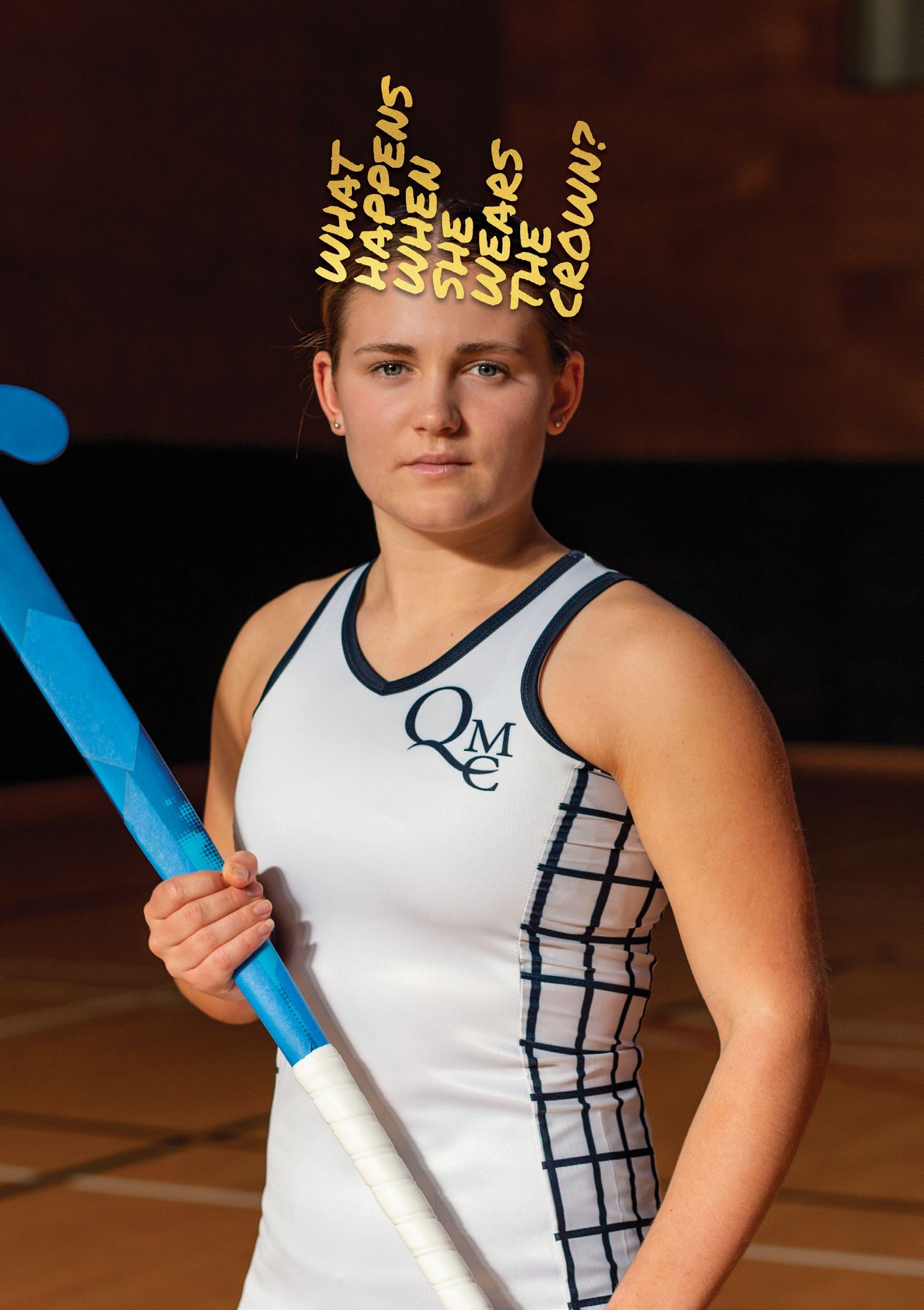
SHE BOWS TO

Student Achievements
Music
▶ Voces Luce: Silver Award, Big Sing Finale
▶ Jubilate: Tui Award, Big Sing Cadenza
▶ QMC Orchestra: Gold Award, MEFA Festival
▶ Banditas Band: Gold Award, MEFA Festival
Visual Art
▶ 1st – ‘Play it Strange’ 2024 & 2025
Dance
▶ 1st – NZAMD Jazz Competition
▶ 1st – NZD Intermediate Jazz Scholarship
▶ 2 x New Zealand School of Dance Associates Programme
▶ 1 x New Zealand School of Dance Scholars Programme
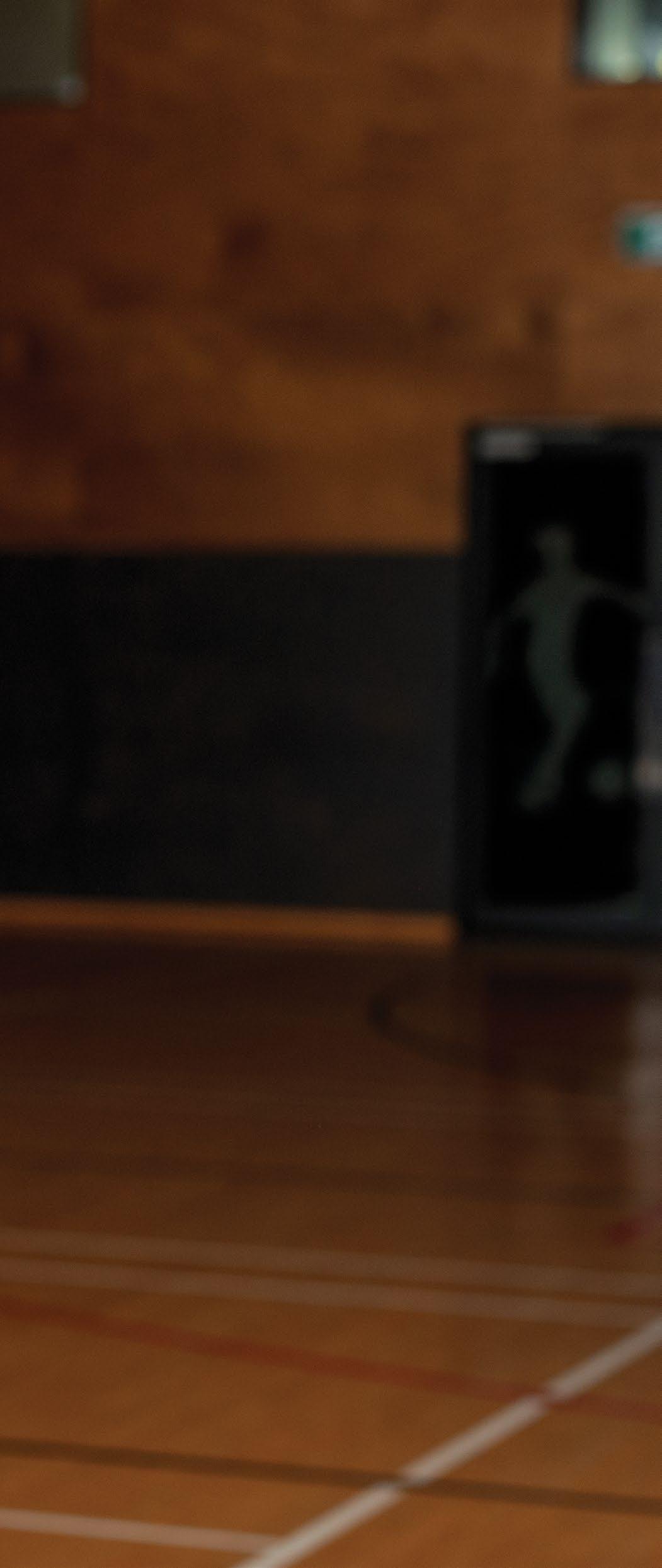
Film
▶ Finalists – 48Hours Film Festival, Wellington Regionals, Year 12
Wellington Representatives
▶ 2 x Wellington Youth Orchestra
▶ 6 x Wellington Youth Sinfonietta
New Zealand Representatives
▶ NZ Secondary Schools Choir – Ananyaa Dharmarajan, Year 12
1st – CSW Championships
2nd - NZ Women’s Stroke Play (Open)
3rd – InterProvincial Gold Championships
2nd – CSW Premiership
1st – Collegiate 1B Competition
1st – Collegiate 2B Competition
2nd – Junior Collegiate 1A
Finalist – Premiere Two Netball
Wellington Competition
Finalist – RSSL Competition
Finalist – Premiere Reserve 5 Netball
Competition
1st – GU15 Quad Skull, NISSRC
1st – GU16 Four, NISSRC
1st – Women’s Intermediate Quad, Wellington Provincial Championships
1st – Women’s Intermediate Four, Wellington
Provincial Championships
1st – Women’s Novice Four, Wellington
Provincial Championships
1st – Women’s Novice Octuple, Wellington
Provincial Championships
▶ 1st – Girls U18 Novice Eight, Wellington
Schools Rowing Championships
▶ 1st – Girls U18 Novice Octuple, Wellington
Schools Rowing Championships
▶ 1st – Girls U18 Novice Quad, Wellington
Schools Rowing Championships
▶ 1st – Girls U16 Eight, Wellington Schools
Rowing Championships
▶ 1st – Girls U18 Quad, Wellington Schools
Rowing Championships
▶ 1st – Girls U16 Four, Wellington Schools
Rowing Championships
▶ 2nd – GU15 Four, NISSRC
▶ 2nd – Women’s Intermediate Four, NICRS
▶ 2nd – Women’s Junior Intermediate Quad, NICRS
Tennis
▶ 3rd – New Zealand Secondary School Championships
Volleyball
▶ 1st – CSW Junior Girls Division 1
Queen Margaret College had a standout presence at this year’s College Sport Wellington SPOTYS, with four students named as finalists for the premier female sportsperson award – an extraordinary achievement for a school of our size. Students are nominated based on their performance, and with seven individual category wins across seven different sports, our students’ success on the regional stage is a testament to their talent, dedication, and the strength of our sporting programme.
College Sport Wellington Awards 2025
Supreme Sports Person of the year:
▶ Gymnastics – Ava Baddeley, Year 13
Winners:
▶ Basketball – Nahala Toeleiu, Year 11
▶ Fencing – Sarah Zhou, Year 10
▶ Football – Greer Wilson, Year 13
▶ Futsal – Greer Wilson, Year 13
▶ Gymnastics – Ava Baddeley, Year 13
▶ Mountain Biking – Iley Nunns, Year 13
▶ Shooting – Pippa Taylor, Year 12
Finalists:
▶ All Rounder of the Year – Lucy Trenberth, Year 12
▶ Swimming – Marina Nadilo, Year 12
▶ Tennis – Emma Roberts, Year 13
▶ Water Polo – Zahra Griffiths Du-Plessis, Year 12
New Zealand Māori Representative
▶ Netball – Bella Vaaitoa, Year 11
Nominees:
▶ 1st XI Football Team – Team of the Year
▶ Aerobics – Imogen Tindall, Year 11
▶ Cricketer of the Year – Anya Birmingham, Year 13
▶ Cross Country/Road Race – Lucy Hannah, Year 12
▶ Diving – Hazel Jeffreys, Year 10
▶ Hockey – Chloe Sherriff , Year 13
▶ Indoor Cricket – Thea Larsen, Year 10
▶ Karate – Sarah van der Star, Year 10
▶ Netball Player of the Year – Lucy Trenberth, Year 12
▶ Service to School Sport – Anya Birmingham, Year 13
▶ Skiing – Alice Simpson, Year 9
▶ Surf Life Saving – Hazel Edge, Year 12
▶ Taekwondo – Katie Haynes, Year 11
▶ Touch – Madi Palu, Year 11
New Zealand Title Holders
▶ Shooting – Pippa Taylor, Year 12
▶ Mountain Biking – Iley Nunns, Year 13
Wellington / Kapiti / Hutt Valley Representatives
▶ Year 7 (2 students) – Aerobics, Rhythmic Gymnastics
▶ Year 8 (6 students) – Aerobics, Basketball, Cross Country, Golf (2 students), Orienteering
▶ Year 9 (14 students) – Aerobics, Athletics, Cross Country, Fencing, Futsal, Hockey, Netball (2 students), Rhythmic Gymnastics, Swimming, Table Tennis
▶ Year 10 (16 students) – Badminton, Cheerleading, Cricket, Dance, Equestrian, Fencing, Futsal, Gymnastics, Hockey, Indoor Cricket, Martial Arts, Netball, Platform Diving, Swimming, Table Tennis, Tennis, Volleyball
▶ Year 11 (13 students) – Aerobics, Badminton, Basketball, Dance, Equestrian Eventing, Futsal, Gymnastics, Hockey, Netball, Swimming, Taekwando, Touch
▶ Year 12 (21 students) – Athletics, Badminton, Cheerleading, Cricket, Cross Country, Football, Futsal, Hockey, Indoor Cricket, Netball, Pool Lifesaving, Rhythmic Gymnastics, Shooting, Surf Lifesaving, Swimming
▶ Year 13 (16 students) – Aerobics, Basketball, Cricket, Football, Futsal, Gymnastics, Indoor Cricket, Mountain Biking, Netball, Swimming, Tennis, Wakeboard
New Zealand Representatives
▶ Basketball – Nahala Toeleiu, Year 11
▶ Fencing – Sarah Zhou, Year 10
▶ Football – Amber de Wit, Year 13
▶ Football – Greer Wilson, Year 13
▶ Football – Katie Pugh, Year 12
▶ Football – Mackenzie Bryant, Year 13
▶ Gymnastics – Ava Baddeley, Year 13
▶ Gymnastics – Lucy Roberts, Year 13
▶ Handball – Annie McKirdy, Year 12
▶ Mountain Biking – Iley Nunns, Year 13
▶ Netball – Lucy Trenberth, Year 12
▶ Shooting – Pippa Taylor, Year 12
▶ Ski Racing – Alice Simpson, Year 9
Professional Women’s Sport
▶ Tokomanawa Queens Professional Women’s Basketball – Nahala Toeleiu, Year 11
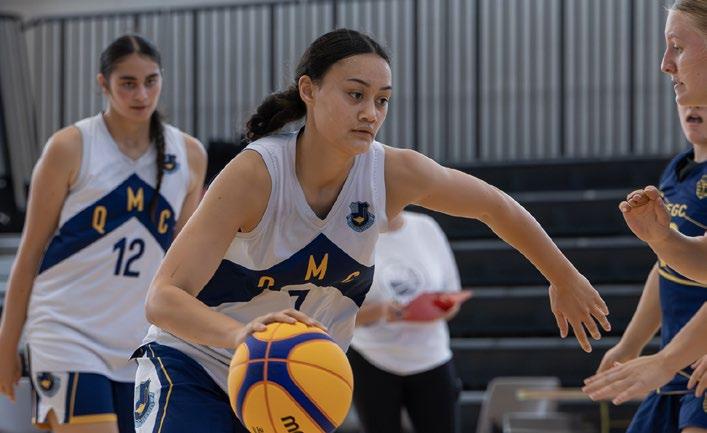
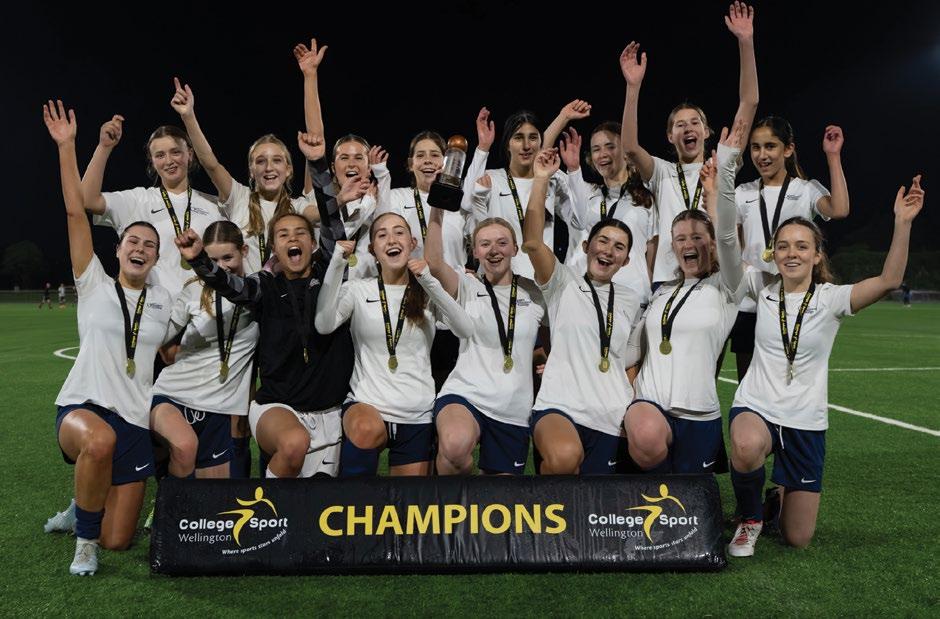

Campus Master Plan – Continuing the Vision
Queen Margaret College remains committed to transforming our campus in alignment with the future-focused goals of our Strategic Plan 2025–2028: Watch it Happen. This long-term vision reimagines the physical heart of the College to create a dynamic, enduring learning environment that better supports the evolving skills, passions, and leadership of our ākonga in an ever-changing global context.
The Campus Master Plan builds on the strong foundation of recent campus developments aimed at shaping 53 Hobson Street into a first-class learning environment, such as the Library (2024), Queen Margaret House, Preschool, and Hobson Gym (2018). Each phase of the Campus Master Plan is designed to elevate learning in STEAM (Science, Technology, Engineering, Arts, and Mathematics), champion wellbeing, and minimise disruption to teaching and learning. Phase 1 – the Creative Industries Centre – was introduced last year as a bold reimagining of the site currently occupied by the Old Gym.
Phase 1 – Creative Industries Centre
The Creative Industries Centre will utilise the site where the Old Gym stands, turning it into a dynamic future-focused hub for art, design, media, dance, drama, and music. As the launch point for the wider Master Plan, it sets the tone for future development – offering purpose-built spaces that foster creativity and innovation.
The Centre will feature two distinct precincts – Music and Drama, and Visual Arts and Technology – connected by a gallery showcasing student work. Planned facilities include an auditorium for performances, a drama studio with theatre lighting and acoustic treatment, and a Music Zone for lessons and rehearsals. The Visual Arts and Technology spaces will include dry studios for photography and theory, a Media Studio with green screen capability, and wet studios for pottery and printmaking, supported by a clay store and kiln.
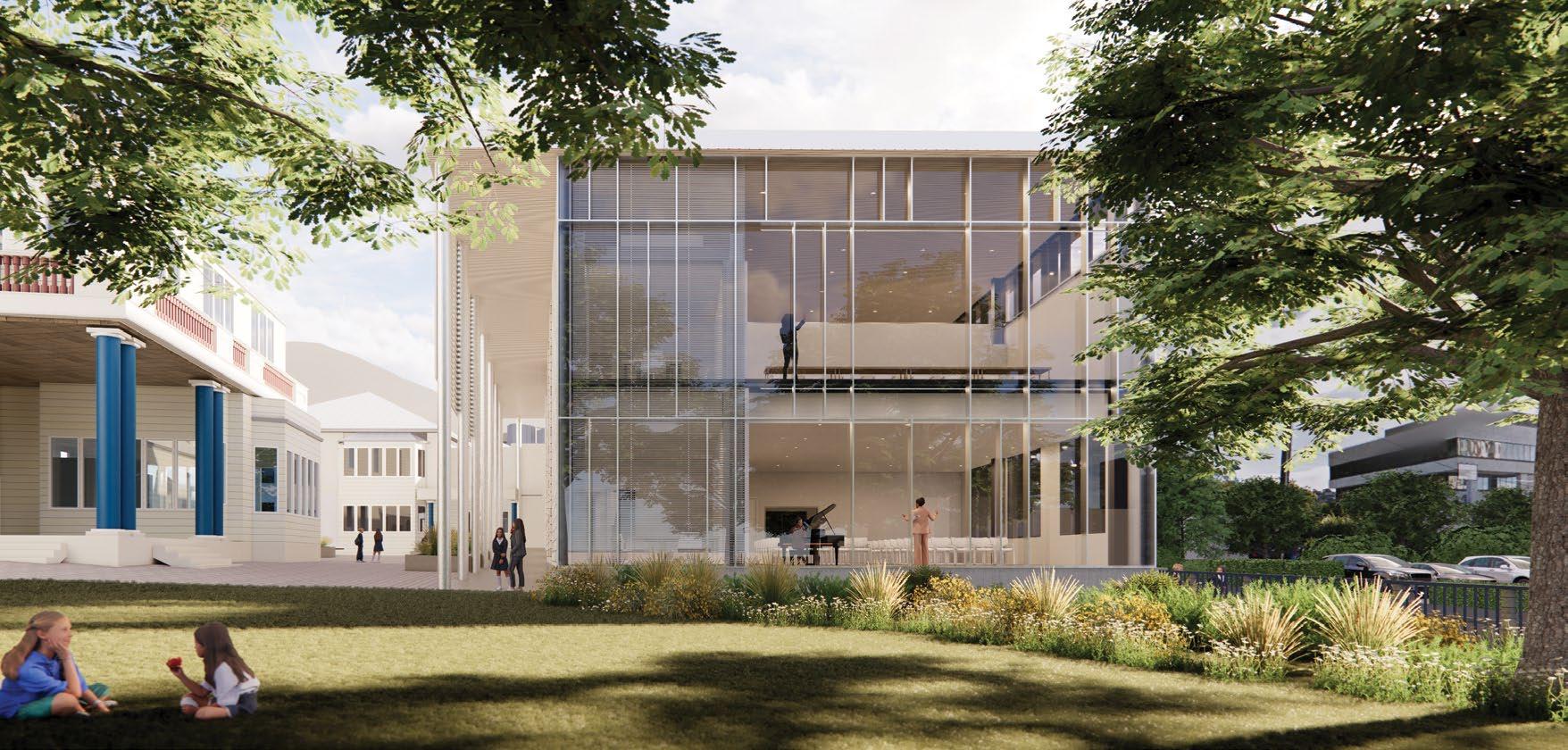
Looking Ahead
While Phase 1 remains the anchor for future development, subsequent phases will focus on specialist centres for STEM and Wellbeing. Each stage is carefully designed to maximise the potential of our urban site and support both academic excellence and personal growth.
Minor Projects – Small Steps Forward
Alongside major developments, minor upgrades continue to shape the campus experience. This year, fundraising began for the Kōwhai Playground – an enhancement of the Junior School Playground –with generous support from our community at the Parents’ Association Annual Quiz Night. As part of the minor upgrades we are also investigating the addition of weather protection over the tennis court to improve usability year-round.
Together, We Build the Future
Delivering the Campus Master Plan is a bold investment in the future of Queen Margaret College –one that will shape our learning environment for generations to come. While progress takes time, every step forward is made possible through the shared commitment of our community. Your support – whether through donations, enthusiasm, or advocacy – helps bring this vision to life. Together, we’re building a campus where creativity, wellbeing, and academic excellence thrive.
Our website provides comprehensive information about the full Campus Master Plan. To learn how you can get involved in advocacy or become a special benefactor, email foundation@qmc.school.nz.
Help us build the future today by scanning the QR Code to donate
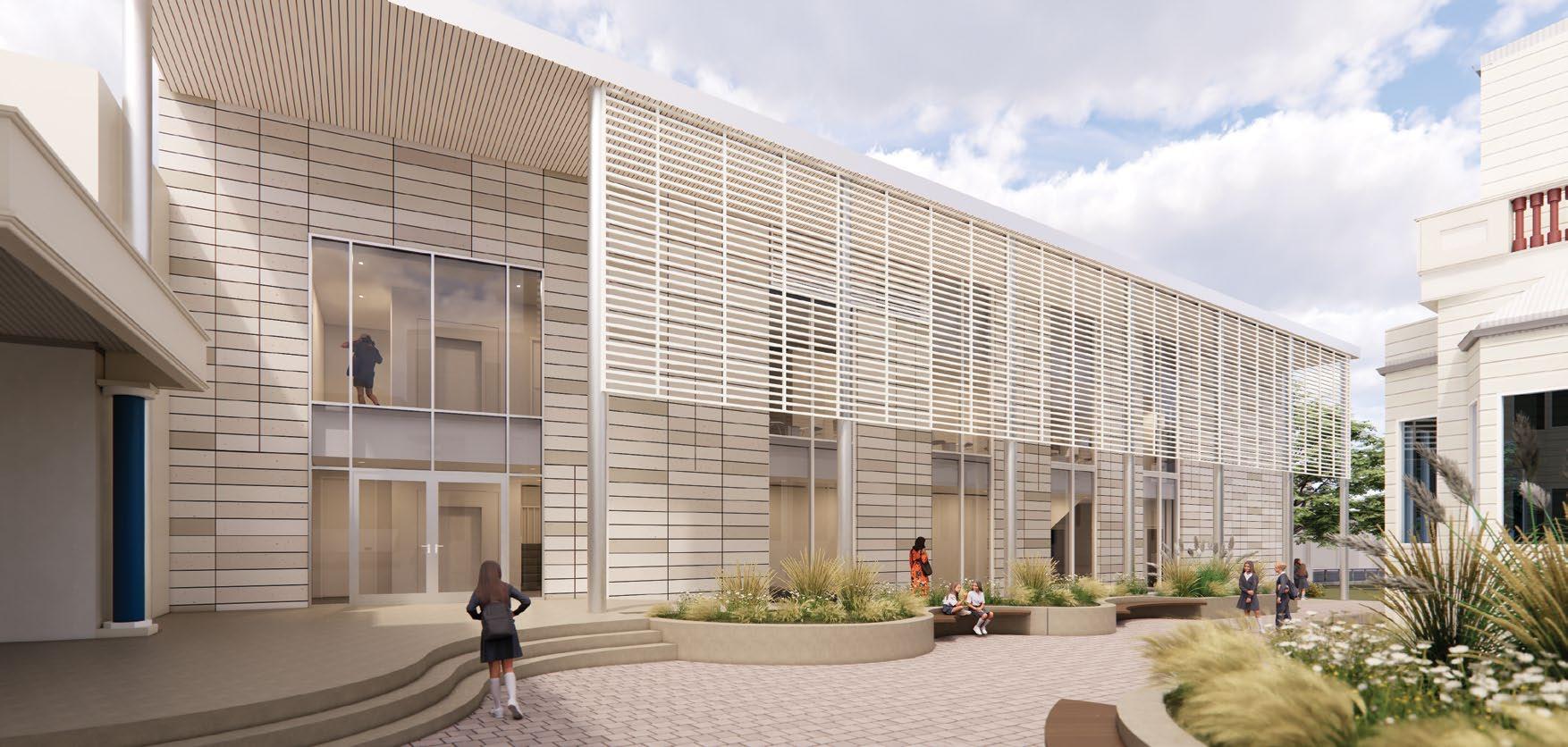
Foundation Trust – A Legacy We Build Together
This year, the Foundation Trust has continued to champion bold ideas and lasting impact by supporting student scholarships, arts-led fundraising initiatives and our exciting campus transformation.
Our QMC Champions, who donate monthly, remain central to our mission, helping fund scholarships that open doors for exceptional young women. Their generosity ensures that talent, drive, and potential – not circumstance – shape a student’s journey at QMC. To learn more about how you can become a QMC Champion and empower the next generation of female leaders or offer bequests of financial donations, please email foundation@qmc.school.nz.
At the heart of our current fundraising efforts is the Creative Industries Centre – a purpose-built hub for art, design, media, dance, drama, and music. We are excited about the opportunities the Creative Industries Centre will bring to our students and wider community. To bring this vision to life, we need to raise $4 million. School fees cover essential operational costs, but they don’t fund capital projects. And because QMC does not receive government funding for campus development, we need our community to help us make it happen. We can’t do it alone – but together, we can make an extraordinary impact. Every contribution helps. Whether you donate $50, $500, $5,000 or more, your support will help launch the next generation of creative New Zealand leaders from the gates of 53 Hobson Street. That next generation includes the girls walking our halls today. As the Creative Industries Centre takes form, our students will be engaged, inspired, and invited to share their ideas and perspectives – so we can build it with their voices, ambitions, and leadership in mind.
In keeping with our focus on the creative industries, our fundraising has been bookended this year by events that celebrate the arts and our QMC community. In May our first fundraising event was Sophia – The Debut Concert. This incredible sold-out performance by opera singer and alumna Sophia Gittings was a moving testament to what happens when QMC students have the tools, access, inspiration and support to hone their artistic talents to a world-class level. Our final fundraising event of the year is our Circa Theatre pantomime fundraiser Robin Hood.
Thank you for your support of the Creative Industries Centre and for helping us shape a future defined by possibility.
Help us build the future today by scanning the QR Code to donate


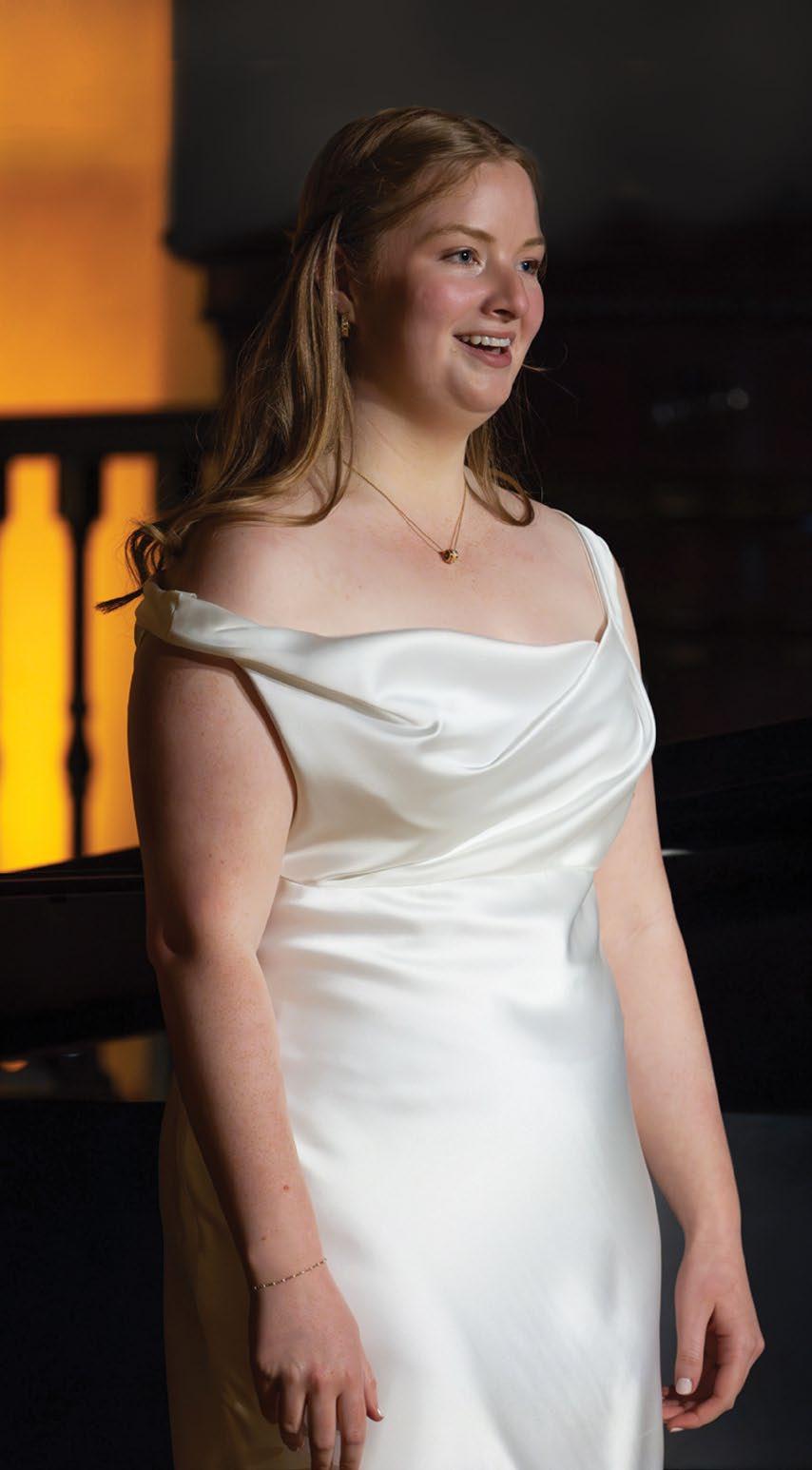
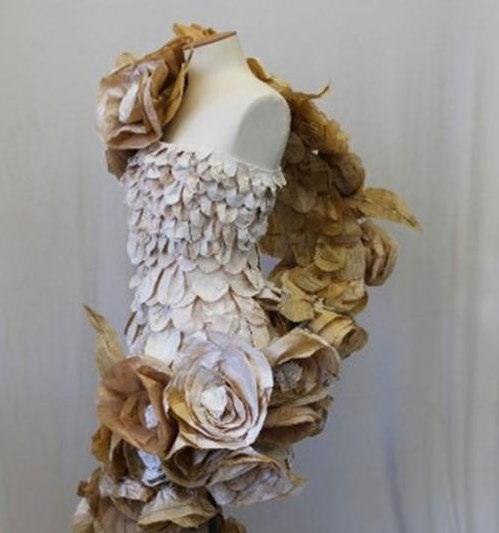
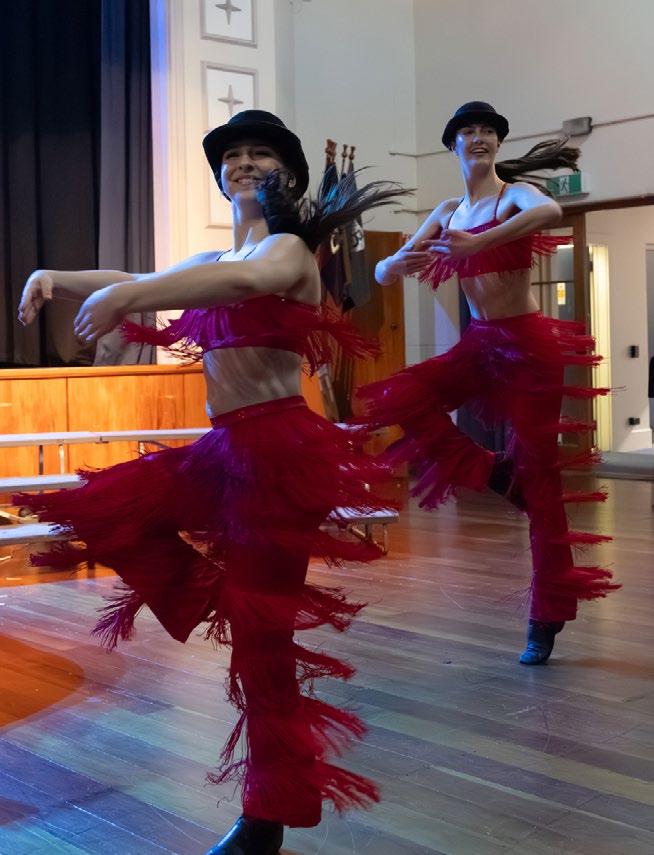

Annual Fees Statement from the Board of Governors
The Board of Governors acknowledges and deeply appreciates the significant financial commitment of parents, caregivers and whānau in investing in your child’s education. We thank you for your continued support of Queen Margaret College.
When setting fees, the Board of Governors carefully considers the impact on fee payers, the operating needs of the College, the economic context of rising costs, and benchmarks against other independent schools. The Board has set the new fees to ensure the College will continue to employ educators with unique skills and talents, invest in future-focused technology and facilities and provide robust curricular and co-curricular offerings.
Please note that funding for our Campus Master Plan is not derived from tuition fees.
For 2026, the Board of Governors has set the fees to ensure that the College continues to provide outstanding education, enabling our young people to become the best versions of themselves for the future they will enter.
Please find on the following page a breakdown of tuition fees and associated charges for the 2026 school year.
As a registered charity, Queen Margaret College reinvests all income generated from fees each year to continue providing the high-quality education of which we are so proud.
It has been our sincere pleasure to witness the successes of 2025 and to help shape the exciting developments ahead. On behalf of the Board, I extend heartfelt thanks to all staff and families for your continued commitment to ensuring the wellbeing and development of our most important asset: our students.

Annual Fees
Domestic Students
Boarding Students
Please note: All term fees listed have been rounded to the nearest whole dollar for clarity.
*All fees and costs are quoted in New Zealand Dollars and include GST (Goods and Service Tax) where required. Fees include tuition fees, fees protection insurance (at 1.98% of tuition fees), technology levy, building levy. An annual community levy of $260 per family ($65 per term) applies for Preschool to Year 13, this is charged each term and includes fees for the QMC Foundation Trust Annual Giving and Parents’ Association Levy. An additional annual Old Girls’ Association Levy of $50 applies to each student in Years 9–13, this is also charged each term.
English language tuition is included in tuition fees and the regular classroom programme. If additional ESOL tuition is required, it is available at extra cost – estimated at a cost of $3,000 per year. This addition includes regular testing and progress updates, specialist Speech and Drama lessons to improve fluency and confidence, and small classes to cater to individual needs.
**The sundry activities deposit is used to pay for camps, private music lessons etc. Any unused portion will be refunded if not used during the school year in line with the College refund policy.
†Fixed annual holiday homestay fee, which covers 7 weeks of term holidays. Any additional homestays can be arranged but will incur an extra charge.
10 FACTS ABOUT GIRLS’ SCHOOLS

Students do better academically, socially and emotionally
1 3 5 7 9 2 4 6 8 10
Students feel empowered to defy gender stereotypes
Participation in STEM is higher at girls’ schools
Students are more confident, self-assured and resilient
Students experience less bullying and greater respect
Girls’ schools better prepare students for career and life success
Students in girls’ schools are happier and feel they belong
Students from girls’ schools have higher aspirations and ambitions
There’s higher participation in sport and physical activity
At girls’ schools, student wellbeing comes first
Source: The Girls’ School Edge, A Comparison of Outcomes for Girls from Single-Sex and Co-Education Schools Using PISA Data. Alliance of Girls Schools Australia, 102/239 Golden Four Drive, Bilinga QLD 4226, Australia, www.agsa.org.au
